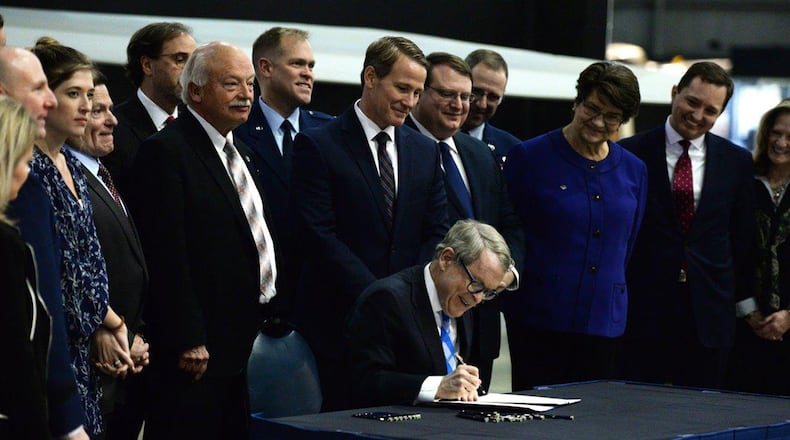“Military service is a very, very high calling that brings with it benefits but frequent relocation can place a burden on families. Our goal today is to remove those barriers,” DeWine said.
Changes of station every few years hurts job prospects for military spouses, particularly spouses with professional licensure or certification, such as educators and health care workers. Ohio has required additional classes and/or examinations so these professionals could work in the state, but the bill effectively erases that requirement as long as that person is in good standing within his or her profession.
That is good news for filling the estimated 300 nursing and 140 vacant teaching positions within a 20-mile radius of Dayton, according to Ohio Means Jobs statistics, the governor said. It will also allow incoming active-duty members who are out-of-state license or certification holders to work during their off-duty hours.
“Dayton takes a lot of pride in its aspiration to be the most military-friendly region of the country,” said Lt. Gov. Jon Husted, noting his work as director of the Governor’s Office of Workforce Transformation. “It is critical for Ohio to do everything it can to not let barriers stand in the way to keep people from joining the workforce.”
A military spouse whose husband is stationed at Wright-Patterson AFB and whose career has been affected by Ohio’s previous regulations, spoke about her difficulties. Brianna McKinnon, who holds a teaching degree with an emphasis in special education earned in the state of Washington, has not been able to practice her profession after her temporary Ohio license expired after one year. She began fighting for her right to work two years ago by meeting with Rep. Rick Perales (R-Beavercreek) and others to change Ohio law.
With the signing of Senate Bill 7, McKinnon said she intends to push passage of similar bills in other states.
“It has been widely reporting that spousal unemployment is among the greatest hardships faced by service members’ spouses. This bill will alleviate that hardship for military families coming to Ohio,” Perales said.
Maj. Gen. Carl Schaefer, deputy commander, Air Force Materiel Command, thanked the governor for having the bill signing at Wright-Patterson Air Force Base. He asked military spouses in the audience to stand and be recognized.
Schaefer knows from personal experience the difficulties military spouses who wanted to work face. He remarked that his wife, Pauline, had to let her athletic training and teaching licensures lapse years ago due to many moves for his military service.
“Of the 8,000 military members stationed at Wright-Patterson Air Force Base, many have spouses who work in professions requiring these licensures and certificates,” he said. “These professionals want to contribute to the community and their families as soon as the military moves them. Now, thanks to this bill, our spouses will be able to smoothly transition their careers toward supporting their families, reducing their stress and contributing to their new community.”
Col. Thomas Sherman, 88th Air Base Wing and installation commander, said, “The bill signed today has far-reaching impacts for military families stationed here in Ohio, especially at Wright-Patterson Air Force Base, the largest single-site employer in the state of Ohio.
“Today reinforces that Wright-Patterson is the community and the community is Wright-Patterson … As the years go by and spouses come to Wright-Patterson, they will truly reap the benefit of the work done and the path that you have given,” Sherman said.
More information on Senate Bill 7 can be found at https://www.legislature.ohio.gov/legislation/legislation-summary?id=GA133-SB-7.
About the Author
